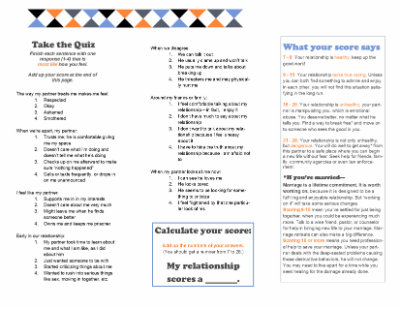 The first obsessive relationship I ever ran into involved someone near and dear to me. For awhile, she couldn’t even see what was happening. Her desire to be “loved” was so strong–and her sense of her own value so weak–that she was willing to accept the poor substitute her boyfriend offered.
The first obsessive relationship I ever ran into involved someone near and dear to me. For awhile, she couldn’t even see what was happening. Her desire to be “loved” was so strong–and her sense of her own value so weak–that she was willing to accept the poor substitute her boyfriend offered.
Fortunately, she finally realized he was cutting her off from all her other relationships, undermining her self-confidence, and unwilling to trust her. He was obsessed with controlling their relationship. So she broke up with him.
Do you have a sneaking suspicion you may be in a similar situation? Don’t let your need for love deprive you of the very thing you’re longing for.
Maybe your relationship is simply lacking in true love. (See our articles True Love or Cheap Copy and 7 Shades of Love to remind yourself what real love looks like.)
Or maybe there’s something much more dangerous going on.
Let’s find out.
What Obsession Looks Like
Obsessive relationships have 3 big problems:
- Anxiety and uneasiness
- Controlling behavior
- Addictive qualities
Anxiety
People in obsessive relationships often report that “my gut told me something wasn’t right.” Sometimes they had to distance themselves from the relationship before they could honestly admit that. But they knew it was bad from the start. Healthy, growing relationships bring us increasing peace. Not swelling discomfort and anxiety.
So the lesson here is: Pay attention to your instincts when they wave red flags.
Control
Obsessive people usually want to make sure they are never abandoned or humiliated, so they try to control their partner. They’re operating out of fear—and fear can make a person desperate . . . or angry. You may see they can’t allow you a healthy amount of space. They may get outrageously jealous if you don’t immediately return their frequent calls or to reply to their incessant texts. They may try to make you believe you’re worthless, so you’ll feel indebted to them for “taking care of” you.
Watch out for manipulation, via either excessive gifts or escalating threats—or anything in between. If you’re feeling more like a possession than a beloved friend, that’s bad news.
Addiction
Addiction treatment experts at Recovery Ranch, say love addiction resembles drug addiction: “Like those addicted to drugs, addicts may become dependent upon the physical and psychological arousal triggered by PEA [phenylethylamine] and other brain chemicals. While romance can be a natural and healthy part of relationships, the love addict pursues romance and the ‘high’ of new love without ever developing genuine intimacy and connection.”
Addicts want their fix at any cost. Don’t confuse a guy’s crazy drive for “higher highs” with being crazy about you. If he loves you, he will show kindness to you, not just demand that you keep giving more to him.
Is This Sounding Familiar?
If the negative behaviors we’ve been describing are sounding eerily similar to your own partner—or maybe to you—then it’s time to take the quiz below. Click on the image, download the quiz, and read it over. Be honest as you answer the questions. Then check out how your relationship scores on the obsession scale.
(Note: Also ask yourself, “How would my partner answer these questions about me?” Both women and men are capable of being obsessive, you know.)
Take Action Now
Work on your relationship if it’s suffering but not harmful. If you’ve hurt the one you love, read what to do here. If you’re the one who’s been hurt, find out what you can do here.
Don’t wait to break free of an obsessive relationship.
Believe that you do deserve to be treated well. No matter what put-down messages you’ve been hearing from your partner (or other negative people) in your life.
Find a safe place to go, where you know people will listen to your story and help you start over. In southwest Minnesota, you can contact Women’s Rural Advocacy Program at 800-639-2350; they specialize in helping women and their children victimized by domestic violence. Another source of help is New Horizons Crisis Center at (507) 637-5570 or (800) 882-1736. (See their website for additional locations.)
———-
Want help developing better relationship patterns? Text or call us at Choices Pregnancy Center.
We are trained in listening to and empowering our clients
to create brighter futures for themselves and their children.

